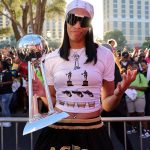Friedman is AEW’s first true homegrown superstar, emerging as Tony Khan’s promotion has gone from an intriguing upstart to the first real rival the WWE has had in decades. When we meet, he’s been the champ since November of 2022. All-time great wrestlers praise him for his skills—but so do Pulitzer Prize-winning critics. In the last few years, he’s participated in some of the best matches in the industry and has held multiple titles. Just 27, he’s young to have the sort of resume he already has. His few peers in that regard are legends: Dwayne “The Rock” Johnson won his first world title at the same age (26), while Randy Orton, the youngest world champ in history, won at just 24. But the big difference between Friedman and those two all-time greats is that The Rock and Orton are third-generation wrestlers, sons, and grandsons of other all-time greats. Friedman, meanwhile, showed up to college on a football scholarship, realized right away it wasn’t what he wanted to do, dropped out (much to his parents’ horror), and started at the bottom. A kid from a nice Jewish family on Long Island, not even six feet tall, Friedman made up for what he lacked in physique with an ego the size of Billy Joel’s Oyster Bay mansion. When I ask how he’s doing, hours removed from his victory over Samoa Joe, he responds, “Brother. I woke up larger than life this morning.”
The history of wrestling is filled with guys whose gimmick is that they’re more famous, sophisticated, or well-off than everybody else. It’s a tricky line to walk: Ted DiBiase’s Million Dollar Belt was really made with cubic zirconium and not diamonds like he claimed in the ‘80s, while Triple H took ill-fated turns as a French Canadian aristocrat named Jean-Paul Lévesque and the “Connecticut blueblood” Hunter Hearst Helmsley before going the leather jacket-and-Motörhead route. Friedman’s schtick is a savvy reworking of that model: the character of MJF, a guy who grew up in one of the nicer parts of Long Island and really doesn’t care what anybody thinks, isn’t all that far removed from who Friedman is himself. His catchphrase? “Better than you.”
His hair has a lot of gel in it, and he wears a Burberry scarf to ring as a signature look. “I made Burberry cool again. Before me, it was only worn by people who were trying too hard,” he says as he picks up a piece of sushi with his chopsticks. Lots of other wrestlers, meanwhile, earn “cheap heat” by trashing a local sports team—but Friedman takes his dislike of all places but Long Island to another level. I ask if he recalls his first time going out of town. “I was miserable,” he says. “Then when I started wrestling, I had to get in my car and drive to places like Kentucky, Indiana, and Dayton, Ohio.” He pauses for a second and shakes his head before continuing down the list. “Orlando, Florida. Tampa, Florida. Ybor City, Florida. Most of the Florida places are gross, but I’ll just never forget just leaving and being like, ‘Oh, every place else sucks.’” To get a sense of just how far he’s willing to take it, just watch the video of Friedman in the middle of the ring during a commercial break during a match in Texas. The show isn’t on the air, but he’s telling the crowd to boo all they want and calling them pieces of shit—before adding that, if abortion was legal in their state, then the fans maybe wouldn’t have to worry about him offending so many children with his language. It’s political commentary little seen in professional wrestling—a little bit Don Rickles, and a little bit of Andy Kaufman, too.



